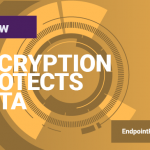
There are no perfect data security measures and security solutions. There is no guaranteed way to prevent a data breach. However, even if your precautionary cybersecurity measures fail, there is a simple way to render the leaked or stolen data virtually useless to cybercriminals – data encryption.
Data encryption is an essential component of any Data Loss Prevention (DLP) strategy. DLP solutions like Endpoint Protector by CoSoSys offer advanced encryption for sensitive data at rest and in motion. Let’s take a look at how encryption works and why it is beneficial for your data security strategy.
How Does Encryption Work?
Encrypting data means encoding it in such a way that it can only be restored to its original form if the person or system decoding it has the appropriate key. Decoding is theoretically possible without this key, but it requires so much computing power and time that it poses no threat. This is because the process employs complex mathematical encryption algorithms.
There are two types of encryption methods: symmetric cryptography and asymmetric cryptography. Symmetric encryption, such as Advanced Encryption Standard (AES), means that the encryption key is used for both encoding and decoding. Asymmetric encryption, such as Digital Signature Standard (DSS) and Rivest-Shamir-Adleman (RSA), employs two distinct keys: a private key for decoding and a public key for encoding, allowing anyone to encode data but only the owner of a private decryption key to decode it. These two types of encryption are frequently used together in complex solutions and secure Internet protocols like SSL/TSL.
Encryption in Everyday Use
Not everyone is aware that they use encryption daily when accessing the Internet. For example, almost every connection to every web page is now encrypted, which prevents bad actors from intercepting your communication within the website. There are many other types of connections, such as the encryption of email messages. Additionally, various apps now utilize encryption for enhanced data security. If you use a VPN, all communication with the VPN provider is also fully encrypted. However, in addition to using encryption-based Internet protocols for data transmission, you can encrypt all types of data before it is sent, making it much more secure. This is particularly important for data at rest, such as files stored on servers or cloud storage. However, this necessitates the use of the functionality of specialized data encryption solutions.
It is worth noting that encryption is such a powerful tool that it is also used by cybercriminals. The entire concept of ransomware is based on the cybercriminal using malware, such as phishing, to gain access to your systems and encrypt all of your data, blackmailing you into paying for the key that allows you to decrypt it.
Benefits of Encryption
Here are the five most important ways that professional data encryption software improves data security and provides extra data protection.
1. Adding a second layer of security
Adding an extra layer of security ensures that even if one of these layers fails, the secured possession is still safe. This is especially true when it comes to data.
The majority of security systems and approaches are centered on the malicious hacker and the attack. They may, for example, detect potential entry points, monitor suspicious activity, or prevent unauthorized actions. However, there is another viewpoint; you can concentrate on the potential theft object. This object is sensitive information in the case of IT systems.
Data is transmitted and stored in its original form in the most basic approach (plain text). This means that if the attacker gains access to the data and the attack-focused security measures fail, it’s game over. They have your sensitive information, and you are paying the price. However, if your data is stored and transmitted in a strongly encrypted format (ciphertext), the attacker simply does not have the resources to decrypt it. Even with all of the world’s computing power, extracting the value from the data would take many lifetimes, rendering the entire attack a failure. This approach is effective in mitigating the risk of data leakage.
2. Meeting potential compliance and legal requirements
In addition to being good for data security, encryption may be required or strongly encouraged by specific laws and regulatory compliance requirements that apply to your business. Standards such as HIPAA, PCI DSS, and GDPR recommend that you use strong measures to protect your data from cyberattacks in many sensitive areas, such as healthcare and financial services, including encrypted data in storage and transit.
The HIPAA Security Rule, for example, states that encryption and decryption are addressable implementation specifications. This means that entities are not required to use encryption/decryption but must document whether it was implemented and, if not, why. PCI DSS requires that the Primary Account Number (PAN) be unreadable when stored and suggests strong cryptography as one method to accomplish this, among many other recommendations and regulations pertaining to the use of encryption, access control, and key management. GDPR does not directly require encryption, but it does recommend that the controller or processor evaluate risks and implement risk-mitigation measures, such as encryption.
3. Increasing your clients’ trust and confidence in your organization
With the rise of cybercrime, particularly in recent years, businesses and individuals are becoming more aware of the dangers of malicious hacking and organized electronic crime and, as a result, are looking for ways to ensure the security of their data and assets. Whatever business you are in, at least some of your customers/clients will be interested in the steps you take to protect their data and assets stored on your hard drives and in your cloud service provider systems, whether they are their Social Security numbers, credit card numbers, electronic currency, or anything else.
You increase your clients’ trust and confidence in your organization by using encryption technologies and publicly disclosing this fact to them. This means that such customers are more likely to stick with your company and recommend it to others. In other words, using encryption could be one of your most effective sales pitches.
4. Helping you maintain the integrity of your data
Encryption processes provide an additional benefit that is frequently overlooked but critical for all types of sensitive data. Encryption protects such data not only from theft but also from all forms of tampering. This is due to the fact that changing the content of encrypted data is as unlikely as decrypting it.
Encrypted data has an unreadable form to humans, but it contains elements such as checksums. which means that any changes to the encrypted data during the decryption process will result in decryption failure and data loss (but not data theft). This means that extra care must be taken to ensure that the encrypted data is not tampered with as it cannot be decoded, but it also means that decoded data is 100% genuine and could not have been tampered with.
5. Avoiding the financial and legal consequences of a data breach
Regardless of whether the security standards, laws, or other regulations mentioned in Benefit 2 above apply to your company, any data breach can have serious financial and legal consequences. Such consequences may include, but are not limited to, fines, customer loss, and lawsuits, and may even lead to the bankruptcy of your business. That is why, regardless of compliance or regulations, any business that deals with information security should prioritize investing in encrypting data in storage and data in transit.
While a data breach that results in encrypted data being stolen will still have serious consequences, they will pale in comparison to those that may occur if the thief is able to use the stolen data. The light at the end of the tunnel in such an event is that, even if your system is breached and data is accessed by an unauthorized party, that party is technically unable to do anything with the stolen data and cannot use it to harm your customers, business partners, employees, and so on.
DLP Policy for Encryption
DLP solutions play a pivotal role in safeguarding sensitive information. To effectively use encryption, organizations must configure their security systems appropriately. Creating an effective DLP policy for encryption ensures that an organization’s intellectual property (IP) and personally identifiable information (PII) are protected against data leaks.
Endpoint Protector offers eDiscovery and Enforced Encryption which can efficiently encrypt sensitive data. With eDiscovery, organizations can create flexible policies based on whitelists and blacklists.
- Whitelists are based on file type and file name and exclude from scanning specific files, like pictures, video files, and others, reducing scan time and consumed resources.
- Blacklists are based on file types, predefined content, custom content (dictionaries), and file name, allowing IT administrators to build policies according to the type of sensitive data stored on users’ workstations.
Enforced Encryption can extend your USB security policies to cover data in transit by using 256-bit AES encryption to ensure data being transferred to portable USB storage is protected from loss or theft. Overcoming the limitations of using OS-specific solutions such as BitLocker and FileVault, Enforced Encryption works across both Windows and macOS.
To learn more about Endpoint Protector’s encryption capabilities, request your demo here.
Frequently Asked Questions
Download our free ebook on
Data Loss Prevention Best Practices
Helping IT Managers, IT Administrators and data security staff understand the concept and purpose of DLP and how to easily implement it.











